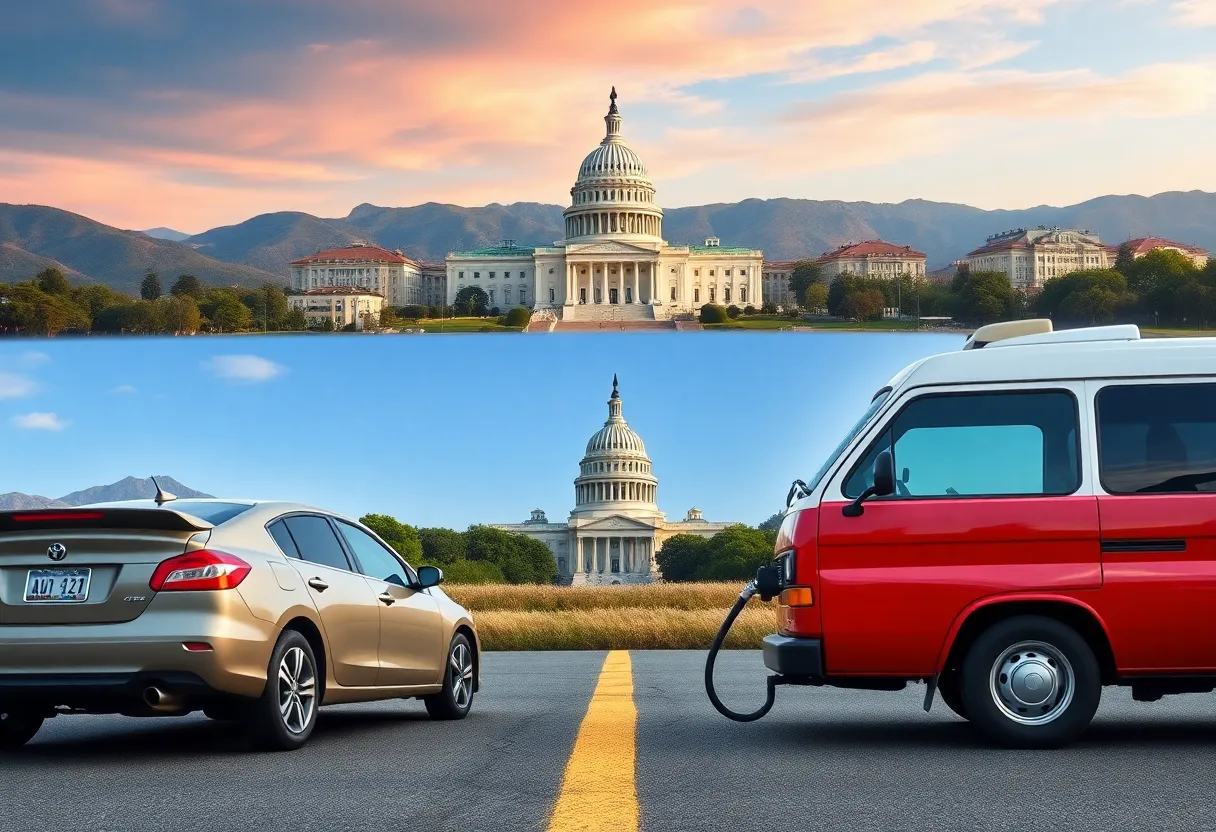News Summary
On May 1, 2025, the U.S. House voted 246-164 to block California’s plan to ban gas-powered vehicle sales by 2035. This decision revokes a waiver granted by the EPA during the Biden administration, highlighting tensions between states and the federal government over environmental regulations. Advocates warn this move undermines climate action as California has gained support from other states aiming for similar bans, while opponents argue it restricts consumer choice in the automotive market.
California – On May 1, 2025, the United States House of Representatives voted to block California’s plans to ban new sales of gas-powered vehicles by 2035, achieving a decisive victory with a vote of 246 to 164. The resolution, known as House Joint Resolution 88, aims to withdraw a waiver granted to California by the Environmental Protection Agency (EPA) during the Biden administration, which enabled the proposed ban on gas-powered vehicles.
The vote reflected a significant divide, with support from 211 Republicans and 35 Democrats. Key supporters of the resolution, including Senator Kevin Kiley from Rocklin and Representative Doug LaMalfa from Oroville, framed the decision as a victory for common sense and emphasized that one state’s regulations should not dictate the vehicle choices available to all Americans.
Alongside Resolution 88, the House also passed two additional measures targeting California’s environmental initiatives. One measure aimed to revoke waivers related to enhanced sales of zero-emissions trucks, passing with a 231-191 vote, while another focused on nitrogen oxide emission standards for engines, which passed 225-196.
In 2020, California’s Governor Gavin Newsom signed an executive order directing the state to halt the sale of new gasoline-powered vehicles by 2035. The order initiated the California Air Resources Board to develop necessary regulations to enforce this ban. However, it is important to note that the executive order does not restrict the ownership or sale of used gasoline-powered vehicles.
In response to the House’s actions, Newsom’s office criticized the use of the Congressional Review Act (CRA) to challenge the waiver. The governor’s office argued that the CRA was applied incorrectly and contradicted the assessment from the Government Accountability Office and the Senate Parliamentarian regarding the CRA’s applicability to the waiver in question.
Senator Alex Padilla of California expressed concerns that this vote undermined the state’s leadership in combating climate change and endangered its economic strength. California has garnered support from eleven other states that have pledged to follow its lead and implement a similar ban on gas car sales, cumulatively representing approximately 40% of the U.S. auto market. Environmental and public health advocates believe that such measures are critical for significantly reducing emissions and improving air quality.
However, opposition persists from Republican lawmakers and various business groups. They argue that the proposed ban on gas-powered vehicles limits consumer choice and imposes unnecessary restrictions on the automotive market. Representative John Joyce of Pennsylvania introduced the resolution to revoke the waiver, emphasizing Congress’s authority to regulate the interstate automotive market.
Adding to the complexity, the Senate Parliamentarian ruled that the waiver in question does not fall under regulations subject to the CRA, a stance supported by the Government Accountability Office. Other lawmakers, including Representative Paul Tonko from New York, conveyed concerns that enacting the resolution might create dangerous precedents for future legislative actions.
In the Senate, Representative Shelley Moore Capito from West Virginia sponsored a resolution targeting the waiver, although she has yet to commit to a vote following the parliamentarian’s ruling. Additionally, the spokesperson for the California Attorney General indicated that legal challenges against this resolution may be forthcoming, as California received a total of three waivers from the EPA under the Biden administration to enforce its vehicle emissions regulations.
This recent development regarding California’s vehicle regulations underscores the ongoing tension between state and federal authorities over environmental policy, consumer rights, and climate action. As both sides prepare for potential litigation and further legislative action, the future of California’s ambitious environmental goals remains uncertain.
Deeper Dive: News & Info About This Topic
- Washington Post: California Cars Waiver House Vote
- Wikipedia: Environmental Protection Agency
- New York Times: California Gas Cars Waiver House Vote
- Google Search: California Gas Powered Vehicle Ban
- The Hill: House Vote California EV Mandate
- Encyclopedia Britannica: Climate Change
- Fox News: 35 Democrats Vote GOP Block Biden Rule
- Google News: California Gas Car Ban

Author: STAFF HERE SAN DIEGO WRITER
The SAN DIEGO STAFF WRITER represents the experienced team at HERESanDiego.com, your go-to source for actionable local news and information in San Diego, San Diego County, and beyond. Specializing in "news you can use," we cover essential topics like product reviews for personal and business needs, local business directories, politics, real estate trends, neighborhood insights, and state news affecting the area—with deep expertise drawn from years of dedicated reporting and strong community input, including local press releases and business updates. We deliver top reporting on high-value events such as Comic-Con International, San Diego County Fair, and San Diego Pride Festival. Our coverage extends to key organizations like the San Diego Regional Chamber of Commerce and United Way of San Diego County, plus leading businesses in biotechnology, healthcare, and technology that power the local economy such as Qualcomm, Illumina, and Scripps Health. As part of the broader HERE network, including HEREAnaheim.com, HEREBeverlyHills.com, HERECostaMesa.com, HERECoronado.com, HEREHollywood.com, HEREHuntingtonBeach.com, HERELongBeach.com, HERELosAngeles.com, HEREMissionViejo.com, and HERESantaAna.com, we provide comprehensive, credible insights into California's dynamic landscape.





